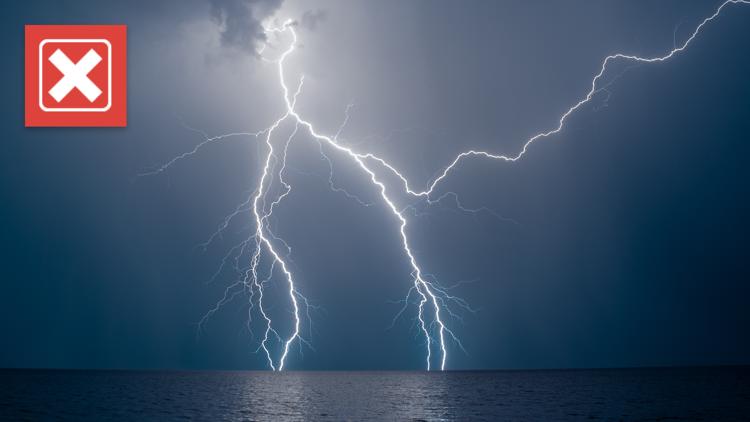Summer is a popular time to go swimming outdoors at beaches, lakes or pools. But thunderstorms are also common across the country during hot weather. When lightning starts to strike, you may have been told you have to get out of the water because it's dangerous to swim during a storm.
A VERIFY reader reached out to ask about swimming pool safety and whether water attracts lightning.
THE QUESTION
Does water attract lightning?
THE SOURCES
- Mike Linden, meteorologist and director of video and social media at MyRadar
- National Weather Service
- National Oceanic and Atmospheric Administration
- A United States Geological Survey article
THE ANSWER
No, water does not attract lightning. But that doesn’t mean it's safe to swim during a storm.
WHAT WE FOUND
Water itself does not attract lightning, but it does conduct electricity, meteorologist Mike Linden explains. This makes it unsafe to be in water during a storm.
“Lightning typically follows the fastest path of least resistance to the ground, which is more often a tall object or the surface of a body of water,” Linden says. Dissolved salts and minerals in water also make it a strong conductor of electricity, he added.
Salts are compounds that consist of positively and negatively charged ions, or groups of atoms. In a solution, they become electrically neutral. But “when water contains these ions it will conduct electricity,” a United States Geological Survey article explains. Electricity from lightning can then seek out “oppositely-charged ions in the water,” according to the United States Geological Survey.
It's not extremely common for lightning to strike in large bodies of water, like oceans, compared to land, the National Oceanic and Atmospheric Administration says. But “when it does, it spreads out over the water,” the administration adds. When this happens, anyone in the water is at risk of electrocution, even if they are on a boat.
The National Weather Service and the National Oceanic and Atmospheric Administration both emphasize how important it is to exit water when a thunderstorm is approaching.
“Open water areas often lack nearby structures to provide adequate shelter from lightning,” so “it’s best to get out of the water at the first sight of lightning or the sound of thunder,” Linden says.
This story is also available in Spanish / Lee este artículo también en español: No, el agua no atrae relámpagos



